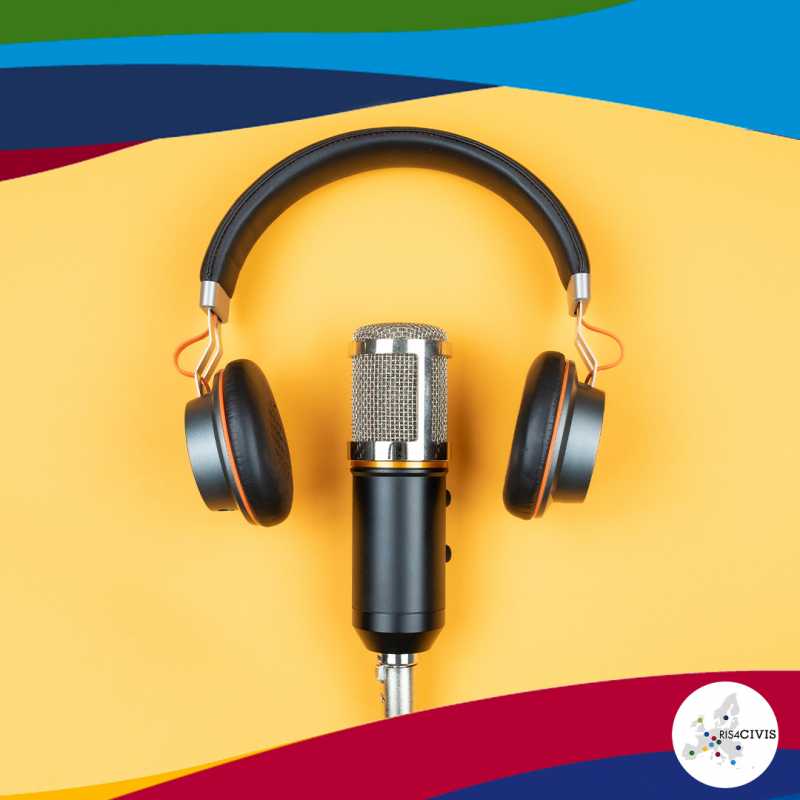In line with our overall mission as Europe’s Civic University Alliance, CIVIS believes in a new way of doing research: more connected, more welcoming and more engaged with social issues. To turn this vision into reality, Module 6 of the RIS4CIVIS project is developing strategies and activities which foster a fruitful relationship between academia and society.
RIS4CIVIS Module 6 - Embedding Citizens and Society

Our objectives for embedding citizens and society in research
Our work is developing common concepts and language to express this vision, which can then inspire tools, practices and policies that can open research to citizens and society. Finally, outreach and training will bring this new model to the researchers themselves, empowering them to embed citizens and society into their own research work.
We will know we have succeeded when we can unlock increased quality and efficacy in these three aspects of the new research paradigm:
- Science Communication – including science dissemination.
- Citizen Science – itself the topic of RIS4CIVIS Module 5.
- Open Innovation (OI) – a commitment to social and challenge-driven innovation, helping us understand the impact of the first two aspects.

Our actions for embedding citizens and society in research
The M6 objectives are being put into practice through four practical case studies:
1. Data Base and Platform for Science Communication and Citizen Science Experts
This expert database gathers experts in Science Communication (SC) and Citizen Science (CS) from all CIVIS member universities, creating an impressive network of CS and SC knowledge. The main objective is to foster CS and SC across the CIVIS Alliance, opening a space for the CS and SD experts to share & exchange good practices and identify common challenges. This network will hopefully lead to events, publications and research projects in the fields of SC and CS. Creating this network of experts will also allow further brainstorming on joint actions to be implemented at the CIVIS level.
2. Guidelines of Best Practices in Citizen Science and Science Communication
The creation of a useful toolkit to guide and support CS and SC initiatives is another fundamental aim of RIS4CIVIS Module 6. We are developing CS and SC guidelines to be published on the CIVIS Digital Campus, targeting the whole CIVIS community (academics, students and staff). These CS and SC guidelines aim to present best practices and methods to inspire anyone, inside and outside academia, who is interested in carrying out CS and SC actions.
3. Training programmes on Science Communication and Citizen Science
Our training programs on Science Dissemination and Communication help participants to increase their knowledge and acquire competencies. We thereby stimulate the emergence of high-quality SC and CS initiatives. In early 2022 RIS4CIVIS Modules 4, 5 and 6 came together to design and implement a CIVIS micro-programme on Science Communication. This first micro-programme was a success, and we followed up by launch of the second edition in the form of a CIVIS Blended Intensive Programme (BIP) for PhD students. Looking ahead, RIS4CIVIS Module 6 is also creating a catalogue of SD and CS training opportunities which will be available on the CIVIS Digital Campus.
4. Recognition of existing actions in Citizen Science and Science Communication
In order to motivate researchers to apply Citizen Science and Science Communication practices in their work, we should disseminate their results and improve the recognition of their initiative. Under this objective, Module 6 is testing two approaches:
4.1 Research Assessment Reform pilot case study
The Research Assessment Reform is a collaborative action with RIS4CIVIS Module 5 (Open Science). This pilot is aligned with the current international discussions on research assessment reform. We aim to contribute to ongoing debates on this topic by proposing new criteria that pay full attention to Open Science practices and results. In Module 6 we are responsible for testing and evaluating the criteria related to Citizen Science and Science Communication.
4.2 Citizen Science and Science Communication Award
The purpose of the CS and SC awards is to recognize and motivate researchers by promoting and disseminating their actions for societal engagement in science. The guidelines and norms for the Award are being developed in collaboration with RIS4CIVIS Module 5.

Science Communication Award
The 1st RIS4CIVIS Science Communication Award is aimed to encourage and reward Science Communication initiatives across the CIVIS Network, and its partner institutions.
The Award
The Science Communication Award is addressed to researchers and research groups across the CIVIS Alliance that carried out prominent and renowned activities of science communication in any kind of conventional (newspaper, video, book, documentaries, interviews, etc.) or digital (e.g.: podcasts, blogs, social networks, and similar channels) media.
The selection process
The jury consisted of experts in Science Communication from the 8 RIS4CIVIS universities. The proposals were evaluated through the following criteria:
- social Impact
- originality
- expositive clearness and critical sense
- capacity of communication for a wide and diverse public
- duration of the contribution
- 1st place: Ms Fabiola Fratini, with the project "The Eco-pedagogical Microforest" - Sapienza Università di Roma
- 2nd place: Ms Elodie Burle-Errecade and her research team, with the project "L’Affaire Pétrarque" - Aix-Marseille Université
- 3rd place: Ms Pilar Amo Ochoa and her research team, with the project "Knowing Science Today Opens the Doors of Tomorrow" - Universidad Autónoma de Madrid
The winners received:
- a Certificate of Award, certifying the award-winning;
- a Monetary Reward of 1000 euros for the 1st position, 500 euros for the 2nd position and 200 euros for the 3rd position.
Administrative support will also be made available to the winners to help them promote their projects. In the case of co-authors or proposals submitted by research groups, the monetary prize will be given to signatories in equal parts.
Thank you all for your applications!

RIS4CIVIS podcast - Embedding Citizens and Society
We are thrilled to discuss with you Citizen Science and Science Communication, and how to increase the connection between research and citizens. For this third podcast, we host Rafaella Lenoir, the module leader on this project as well as Javier Baena, co-coordinator of the module within RIS4CIVIS. We will hear about the creation of a guideline of best practices in Citizen Science and Science Communication but also discover the new Science Communication Award that was recently launched.This initiative is an integral component of the RIS4CIVIS project.
Research Assessment Reform
Research Assessment Reform is a key theme within RIS4CIVIS, encompassing Open Science, Science Communication and Citizen Science. RIS4CIVIS modules have worked together to improve research careers, assessment criteria, local institutional structures and national legislation. Discover their achievements in the podcast, with the valuable presence of Mihnea Dobre, Associate Professor of Philosophy and History of Science, Rafaella Lenoir, responsible for Open Science at the Universidad Autónoma de Madrid, and Fabien Borget, Professor of Chemistry and Open Science Project Manager at Aix-Marseille Université.

Briefing note
RIS4CIVIS modules leaders have addressed briefing notes to advocate decision-makers on relevant guidelines based on their experiences and main findings. Briefing notes give decision-makers knowledge and provide recommendations on key actions areas such as Open science, Human Capital, Infrastructure, Civil Society or Industry.
